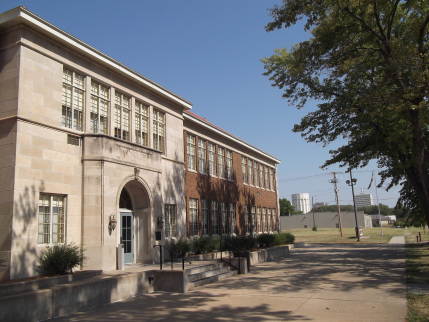Went looking for America and couldn't find it anywhere...
Added on Sunday 19 Aug 2012
 I blew, or rather soughed into Topeka (which, unlike Kansas City, is the actual capital of Kansas) like a strung-out piece of half-chewed taffy, and came ingloriously to a shuddering halt.
I blew, or rather soughed into Topeka (which, unlike Kansas City, is the actual capital of Kansas) like a strung-out piece of half-chewed taffy, and came ingloriously to a shuddering halt.
I’d swum through a sea of white and silver silos, wheatfields, sad old car lots, State Police and hold-ups on the highway. St Louis’ Prairie Arch still stood tall above the city. Paddle steamers tramped gaily down the Mississippi and great, empty former warehouses stood sadly by the banks of Old Man River.
A sign in St. Louis’ notorious Greyhound terminal (we will lose yore luggage! Guaranteed!) stressed the need for courtesy while, a few dozen yards further on, a driver or transportation agent with a broad Missourah accent barked at a bunch of poor unfortunate passengers with all the wit, civility and tact of a prison warder at Shawshank. I wondered, as he snapped out something about taking their shoes off before they reboarded, whether he was shepherding a newly-released gang of ex-cons.
Two girls gliding along like liquid chocolate in motion seemed to be the first allowed on the bus while slow-moving chaos reigned at the gate. They’d tried to make us board their new Express service via separate groups of seat numbers back in Chicago, ensuring everything took twice as long. At the time, I’d acidly commented:
“It used to work fine. Then they organised it.”
That, however, all went by the board in St. Louis, and apart from being half-an-hour late, we chugged out pretty much on time...
But when I reached Topeka, it all came to a halt even more effectively than Greyhound could have managed. There simply was no bus service to Council Grove. Period. It seems America is now so totally reliant on the car that most branch or subsidiary bus lines have just withered away.
I’d dropped into the lobby of the local Ramada Inn as there wasn’t much else to do at two o’clock in the morning in Topeka (to be a bit catty, it didn’t look like there’d be much to do at two o’clock in the afternoon, either), and found out from a gentle-voiced security guard that Arrow Stage Lines was no more (if indeed it had ever even existed), and that the only way I’d get anywhere near Council Grove was if I hitched, hired a cab or flew. No wonder that, growing up in Kansas, Superman learnt to fly. It was probably the only way he could get around.
But, and this must clearly be said, that good and decent gentleman was then kind enough to let me hang around in the lobby until the break of day.
And that, I suppose, sums up the fine and decent Westerner of Middle America. Seemingly a tad slow and thoughtful, but considerate and hospitable both at the beginning and end of the day.
There’s the other side to consider, though. The comments in Topeka’s Metro Voice of August 2012 to the effect that, ...”in science, your child will learn he is not the product of an evolved ape,” or the decision by the Boy Scouts of America that “it will not be changing its membership standards to allow openly gay persons.”
Then there’s the subterranean Cheyne-Stokes breathing brought on by the twin terrors of crops in trouble and a stalling economy. Corn is Kansas’ second biggest crop, and among other things 40% of that entire crop usually provides ethanol for America’s automobiles.
Unfortunately, by mid-summer of 2012 63% of America’s entire landmass was stricken with drought, and the one-half to three-quarters of an inch of rain a day which the corn plant’s tassel needed to pollinate was nowhere to be seen. Nearly 40% the United States’ entire corn crop is burning on the bare red earth beneath blue and empty skies. 2,000 counties in 29 states (82 in Kansas) have been declared natural disaster areas, and the effects of the disaster will ripple outwards, pushing up fuel prices and damaging the U.S. trade balance.
All this despite the fact that, last spring, American farmers planted 96 million acres of corn, the most since 1937. They couldn’t have known they’d also run into the worst drought since 1937...
“The sun flared down on the growing corn day after day until a line of brown spread along the edge of each green bayonet. The clouds appeared, and went way, and in a while they did not try any more ... The surface of the earth crusted ... and as the sky became pale, so the earth became pale, pink in the red country and white in the grey country.
In the water-cut gullies the earth dusted down in dry little streams ... And as the sharp sun struck day after day, the leaves of the young corn became less stiff and erect; they bent in a curve at first, and then, as the central ribs of strength grew weak, each leaf tilted downward. Then it was June, and the sun shone more fiercely. The brown lines on the corn leaves widened and moved in on the central ribs. The weeds frayed and edged back toward their roots. The air was thin and the sky more pale; and every day the earth paled.”
(John Steinbeck ; The Grapes of Wrath)
Despite the deepening shadows of the grapes of wrath, it would be so easy to wrap up this article with a glib and shallow summary, but there’s an old school building south east on Monroe which tells a better tale of the hospitality and fairness of the Midwest Kansan.
Blacks moved west to escape the segregations still practised in the South, coming to Kansas from the turn of the twentieth century to find a better life, and by and large they did. Segregation does not appear even to have been practised in rural Kansas. It wouldn’t have been an absolute rural idyll, and there would have been bigots, but the Klan did not ride and the work was steady.
Urban Topeka, however, still segregated the schools, but by the standards of the time that segregation was fairly managed. All schools were of the same standard and blacks got a good education, but not in the same classrooms as whites.
However, by the early nineteen-fifties the National Association for the Advancement of Coloured People (NAACP) had been challenging laws which upheld the colour bar for nearly twenty years. Segregation, for example, had been institutionalised in 1896 by the case of Plessy v. Ferguson, in which the U.S. Supreme Court upheld the concept of separate-but-equal facilities for blacks and whites. In 1951, Topeka’s NAACP chapter filed suit (Oliver L. Brown et al. v. The Board of Education, Topeka [KS]) against the Board’s policy of segregation in District Court. By 1952 the NAACP had taken the case of Brown v. Board, and four others to the Supreme Court. All five cases were combined under the title of Brown v. Board, and the NAACP argued that although facilities were indeed much the same in Kansan schools, black students suffered psychologically by being classed as different and in practice felt inferior, in violation of the US Constitution’s 14th Amendment.
In brief, the NAACP won their argument. The Supreme Court’s landmark 1954 decision with regard to Brown v. Board overturned Plessy v. Ferguson, changed the federal law of the United States, desegregated classrooms nationwide and paved the way for the Civil Rights Movement of the Sixties.
But judgments made by learned men in the Supreme Court are one thing. The grassroots reaction of rednecks and bigots to those judgments quite another.
So what happened in Topeka when the Board of Education put the new rules into practice?
Nothing much, it seems. No lynching, no riots, no muss, no fuss.
I think that pretty much sums up the fundamental fairness of the Kansan. They obeyed the laws of the land when they had to, and maybe they liked it and maybe they didn’t. But when that law changed, they just shrugged their shoulders and adapted, honestly and hospitably.
There is an old school building south east on Monroe. Once, only blacks walked its halls, and then one fine day whites did, too. The way Topeka allowed the legal challenge and then adopted the legal change without fuss or bother gave the ripples of that change the chance to spread out over the whole country.
Yeah, the Kansans might seem a tad conservative and they sure do like their Bible, but when they were tested in the most radical way, they were hospitable to their fellow Man, and that’s a fundamental lesson in good behaviour which echoes down to us today.







